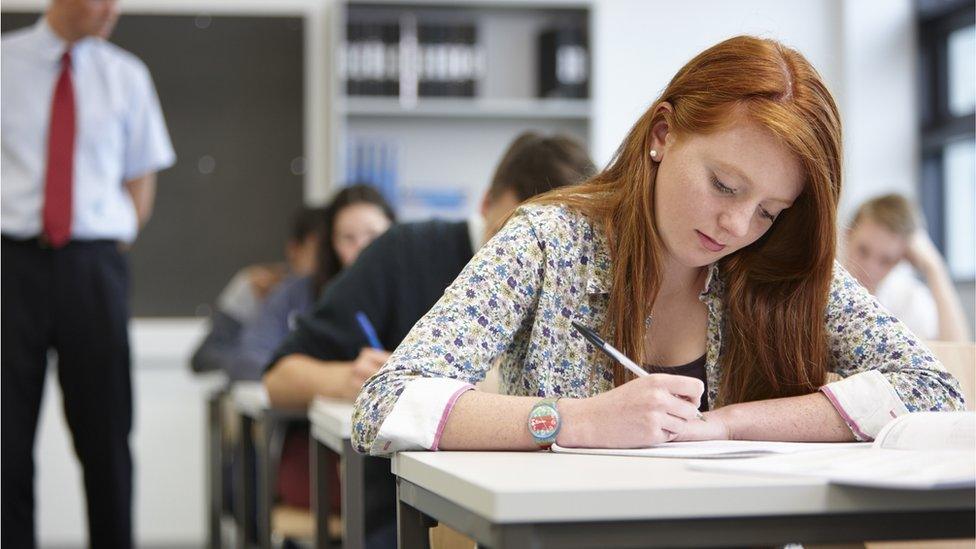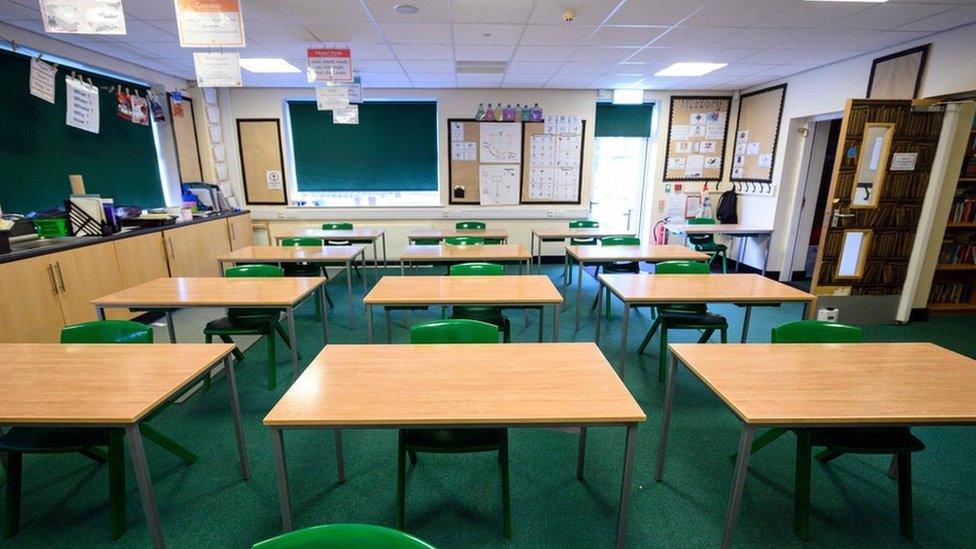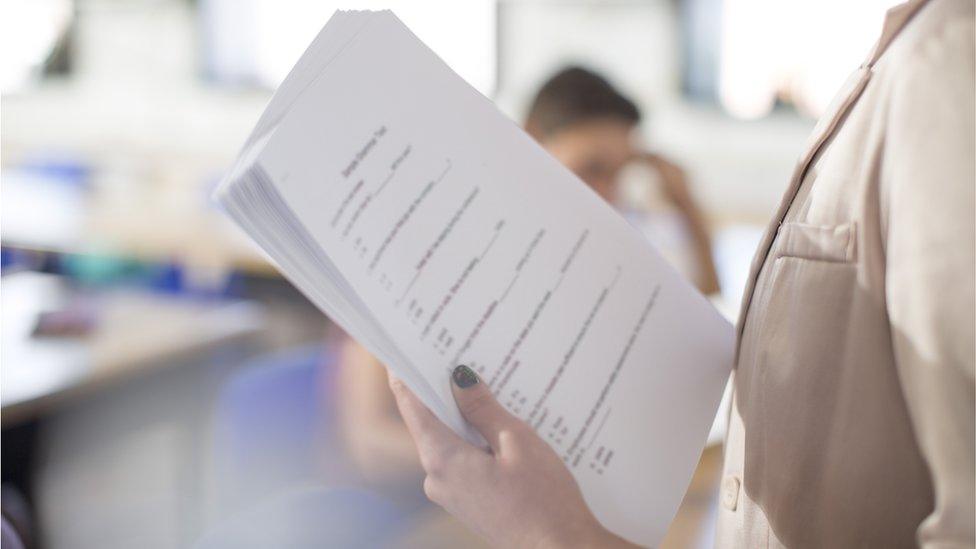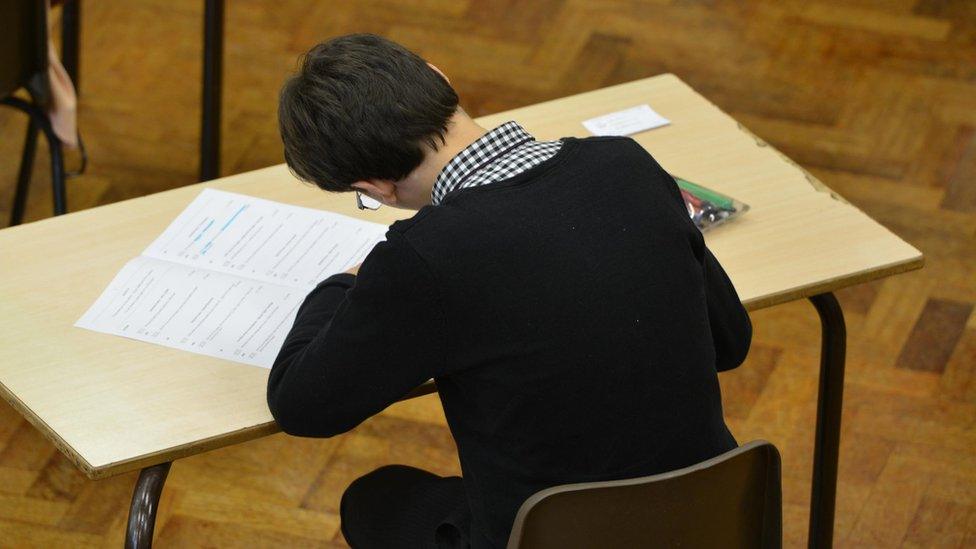Q&A: A-level results day in Northern Ireland
- Published

More than 25,000 students in Northern Ireland are due to get their A-level and AS results on Tuesday
It's results week, with thousands of pupils in Northern Ireland due to find out how they have fared in their A-levels, AS-levels, BTecs and GCSEs.
Pupils are set to receive the results of their A and AS-levels on Tuesday and GCSEs on Thursday.
Students taking BTecs will also receive their results this week.
Here is all you need to know about A-levels and how they have been affected by Covid-19 this year.
Who is getting their results on Tuesday?
More than 25,000 students in Northern Ireland are due to get their A-level and AS results on Tuesday.
Summer exams had been cancelled for the second year in a row due to disruption caused by the coronavirus pandemic.
A-levels are subject-based qualifications that can lead to university, further study, training or work.
The Council for the Curriculum Examinations and Assessment (CCEA) is responsible for the regulation of A-levels, AS-levels and GCSEs in Northern Ireland.
How have the results been decided this year?
A combination of coursework, in-class assessments or exams and homework have been used by teachers to decide grades.
The head teacher of each school has to sign off the results and say there is evidence to back them up.
The Northern Ireland exams board CCEA will review how schools award grades to "ensure fairness and consistency".
Statistical standardisation using an algorithm will not be used to determine grades after it proved controversial in 2020.
Can students appeal against their results?
Pupils will be able to appeal against their A-level, AS and GCSE results in 2021 if they think an "unreasonable academic judgement" was made by their school.
CCEA has published details of the appeals process if a pupil is unhappy with the grade they have been awarded by their school.

Education has been disrupted in Northern Ireland due to the coronavirus pandemic
A pupil will first have to appeal to their school if they think their grade is wrong because the school made an administrative error or did not follow proper procedures in calculating their grade.
But if pupils are still unhappy after that process, they can then appeal through their school to CCEA itself if they think an "unreasonable academic judgement" was made in awarding their result.
A school will be obliged to lodge that appeal to CCEA if a pupil requests it and completes a form outlining their case.
While CCEA will not re-mark a pupil's work, it will look at whether their grade was right based on the evidence the school used.
CCEA has said if it "finds that a grade is unreasonable, we will award a new grade that we consider best reflects the evidence we have seen".
CCEA will not charge fees for appeals in 2021.
What if I don't get the grades I need?
A range of services are available if you do not get the A-level grades you need.
The NIDirect government website, external provides advice on the next stages of the process and says it is "worth checking if the institution is willing to confirm your place anyway, especially if you only just missed the grades".
A careers adviser can be contacted through the chat-with-an-adviser button on the website or by calling 0300 200 7820.

Grades will be based on evidence gathered by teachers, including homework, coursework and, in some cases, exams or assessments taken in class
The Department for the Economy says webchat and phone opening hours are being extended over the results period and career advisers will be available from 09:30 BST to 19:00 on Tuesday through to Friday.
Pupils who have applied to university can track their applications through UCAS, external.
Students can also apply for a course through clearing, external after they have received their results.
It is often used by students who either got different grades than they expected or if they have changed their mind about a course.
CCEA, external has set up a dedicated results helpline which is available on 028 9026 1220 from Tuesday morning at 08:30.
What about BTec results?
Thousands of students across Northern Ireland will also receive their BTec results.
Many students move into higher-level education with their BTecs, which work as A-level equivalents.

Many BTec qualifications are being graded by teachers rather than through external assessments
BTecs are aimed at people interested in working in a particular industry, such as engineering, hospitality or childcare.
BTec students will receive teacher-assessed grades this year - no external assessments or algorithms will be used.
The exception to that is BTec students taking qualifications that can only be required through practical assessment, such as training to become an electrician.
In those instances, external assessments will still be used to check skills - they were adapted to allow for social distancing.
What about GCSE results?
GCSEs are the qualifications taken by 15 and 16-year-olds to graduate from the Key Stage 4 phase of secondary education in England, Wales and Northern Ireland.
Pupils in Northern Ireland will receive their GCSE results on Thursday.
Grades awarded to pupils will be based on work they have completed in school.
CCEA says a student's grade in a subject will be based on "their teacher's professional assessment of the evidenced standard at which they are performing".
Teachers can base their decisions on a number of different aspects, including mock exams or other tests taken during the course, questions provided by exam boards as a guide, coursework and other non-exam assessments.
CCEA says it will review how schools award grades to ensure fairness and consistency.
Statistical standardisation using an algorithm will not be used to determine grades.
Pupils in year 11 taking GCSE units or modules will not be awarded grades this summer.
The exception will be pupils taking GCSE maths who plan to study GCSE further maths in year 12 and GCSE Irish students who will move on to study GCSE Gaeilge.
Will exams be back to normal in 2022?
GCSE, AS and A-level exams in Northern Ireland will take place again in the 2021-22 school year.
However, pupils taking those qualifications through the CCEA exams board will sit "significantly fewer" exams in each subject.
Parts of AS and A-level courses in the majority of subjects are to be dropped in 2021-22.
AS grades given to pupils this summer will not count towards their A-level grade in 2022.
Prior to the pandemic, AS results made up 40% of a pupils overall A-level grade.
Related topics
- Published17 May 2021
